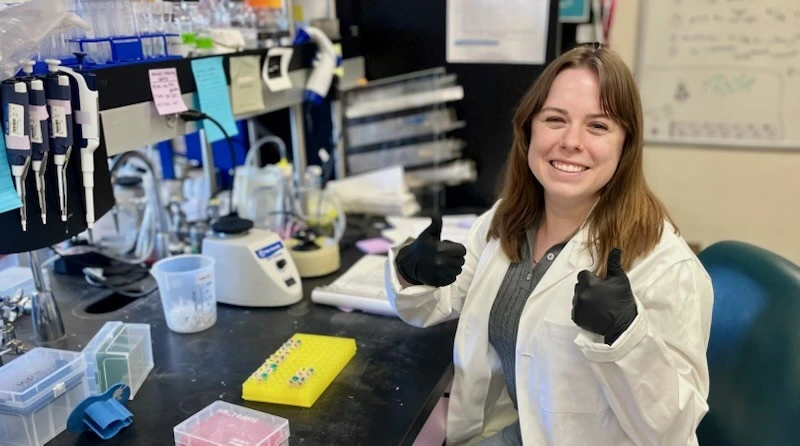
AY26 Comrie Fellowship goes to: Danielle DiFranco, CBIO GIDP
Danielle DiFranco can trace the dots that led to receiving the prestigious Andrew C. Comrie GIDP Doctoral Fellowship all the way back to her 7th grade science class.
“As a kid, I was really interested in reading and literature until 7th grade when we did a genetics section in our science class. From then on, I was super interested in biology, specifically genetics,” DiFranco said. “I loved doing Punnett squares and was super interested in Dolly the sheep,” she said, referencing a method used to predict offspring traits, and the first successfully cloned mammal, born in 1996.
DiFranco is entering her fourth year as a Ph.D. student at The University of Arizona in the Cancer Biology Graduate Interdisciplinary Program (GIDP) with a minor in Molecular & Cellular Biology.
The fellowship honors Dr. Comrie’s unwavering commitment to interdisciplinary research and study. Dr. Comrie, the Chief Academic Officer for the Arizona Board of Regents, is a geographer, interdisciplinary climate scientist, and former Provost at the University of Arizona. He holds an academic appointment as Professor in the School of Geography, Development & Environment, with joint appointments in Hydrology & Atmospheric Sciences and in Public Health. Dr. Comrie has published widely in specialized and interdisciplinary international journals and his work has been funded by federal, state and local agencies.
Of her career choice, DiFranco said: “I have always wanted to do something in my career to help people, and I have an aptitude for molecular biology, so I have directed my passion into studying human disease from a molecular perspective in the hope of improving care and therapies.” Her research focuses on an aggressive form of breast cancer called triple negative breast cancer (TNBC). “I want to contribute to developing better therapies for that type of cancer and for those patients,” she said, adding that her time in the lab includes running experiments and conducting research to that end.
Born in Colorado and raised in east Michigan, DiFranco is keenly aware of the need to work with colleagues such as chemists, clinicians, bioengineers, and others whose work – along with her own contributions – will lead to accessible lifesaving treatments. “We can’t do everything on our own. It’s a good mindset to know that collaborating with others will help us do better.”
DiFranco is grateful to have been selected to receive the highly coveted fellowship. It will allow her to work solely on her dissertation while also focusing on professional development in preparation for the job market. This dedicated scientist also recognizes the need to be of service to undergraduates as well as first-year doctoral students who benefit greatly from the mentorship and guidance of more experienced students. As a co-coordinator mentoring first-year doctoral students in the Arizona Biological and Biomedical Sciences, where DiFranco’s own doctoral journey began, she and her peers organize events and panels that inform incoming students about ABBS programs to consider for their doctoral degrees. “It’s important for me to contribute to science advocacy, and this is one way to do so.” She is also a co-representative on the Cancer Biology GIDP Executive Committee, where she can advocate for her peers and share concerns during regular meetings.
Research Interests
The Chair of the Cancer Biology GIDP, Dr. Cynthia Miranti, wrote in the Comrie Fellowship nomination for DiFranco, in part:
“Danielle is a very driven, highly motivated scientist with a passion for interdisciplinary research. As an undergraduate, while majoring in molecular, cellular, and developmental biology, she also pursued a minor in public health. It was her exposure to this other discipline that motivated her to apply to the Cancer Biology GIDP to study cancer. The study of cancer is inherently a multi- and inter-disciplinary field involving collaborative interactions between clinical science, basic science, public health, pharmacology, genetics, and bioengineering. In keeping with her passion to address public health concerns, Danielle has chosen a very translational project with the potential to directly help cancer patients.”
DiFranco's motivation lies in the desire to reduce human suffering caused by disease. She chose to focus on TNBC because it is an aggressive form of cancer and there are currently limited therapies. "Pursuing my doctorate at the University of Arizona has given me the opportunity to interact with professionals in diverse areas of health careers. When presenting my data at the University of Arizona Cancer Center Annual Scientific Retreat and the Ginny L. Clements Breast Cancer Research Institute Annual Symposium, I was also able to attend talks by experts in medical oncology, public health, and basic cancer biology. I was witnessing the connections between biology and public health in real time. It is inspiring to see teams of laboratory scientists, clinicians, and policy makers working together for the benefit of human health and I want to be a part of that type of team."
DiFranco described her ultimate career goal as transitioning into, "a position where I can develop science policy that helps reduce health disparities. The National Institute of Health has an Office of Science Policy and an Office of Legislative Policy and Analysis, and I think either of these offices would be an excellent place to meet my career goals as they have a direct role in creating national science policy. Similarly, a state or local position where I could inform science policy would be equally rewarding."
Contributions to the endowment that funds these awards can be made here.

